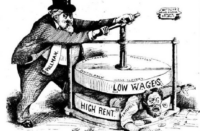Just as it did with St Patrick’s Day, the state has decided to take over the 1st of February—the beginning of spring, traditionally known as St Brigid’s Day—and convert it into another cheap stunt for promoting tourism and “selling Ireland.” (The only wonder is that there’s anything left to sell.)
The first day of spring is recorded from earliest times as Imbolc, a term of uncertain origin but probably meaning the season of pregnancy and birth, especially of domesticated animals. In the Early Christian period the event, like so many others, was taken over by the Church and turned into a holy day, this one in honour of Brigid (Modern Irish Bríd), a pagan goddess who was then reinvented as a Christian saint.
The Department of Foreign Affairs is the organiser of a programme of “global St Brigid’s Day events,” claiming that the day “has long symbolised hope, renewal, and the feminine,” which will come as a surprise to Irish people. A group made up of officially approved intellectuals and carefully selected bourgeois women will be trotted round the world, just as the usual suspects have been on St Patrick’s Day, to promote the export of this non-existent festival.
Utter nonsense has been invented by the state to promote itself and to project its contemporary stance backwards a thousand years, making the non-existent saint sound like a 21st-century politician. Michael D. Higgins (or his scriptwriter) was carried away: “We celebrate the courage and commitment of St Brigid in her day…” Irish women have benefited from the “inspiration and legacy” of this non-existent personality, who “dedicated herself to innovation in the realm of education… in seeking to ensure that her voice was heard in a male-dominated world.”
Practically every facet of traditional culture has been allowed to die out, when not actually exterminated; but any scraps that can be sanitised and repackaged as harmless nonsense have been turned into commodities that the gombeen class and its state can hawk around the world to help make Ireland “the best small country in the world in which to do business.” The best small country in the world in which to live and have a decent life, however, is not part of the agenda.






